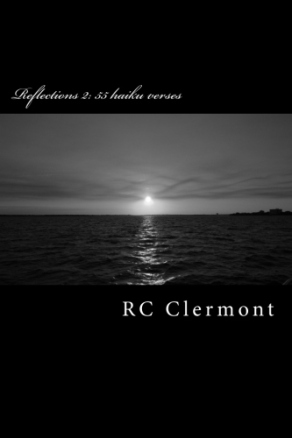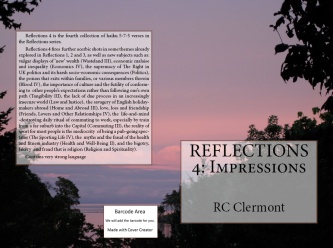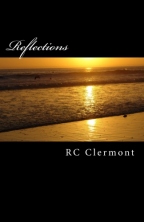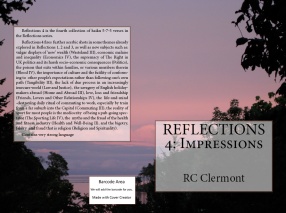
ELECTION 08/11/16 #1
It’s all over, folks.
Got Bachelor’s or Master’s?
Forget about it!
Act dumb now; when going out
Pretend to drag your knuckles
© RC Clermont 2016


ELECTION 08/11/16 #1
It’s all over, folks.
Got Bachelor’s or Master’s?
Forget about it!
Act dumb now; when going out
Pretend to drag your knuckles
© RC Clermont 2016
Didn’t this page tell you in previous posts?
You’ve done it now, people of America. He is now your next C-in-C.
You get the leaders you deserve.


It is polling day in the USA. This haiku is from my verse ‘Red I‘, from the section Atlantic, in Vol 2 of my Reflections series, available at Amazon Books and on Kindle. [Type Poetry/Genre/Haiku/RC Clermont]

Socialised healthcare?
No – God and guns. In droves they
vote against what is right.
© RC Clermont 2013
I am in the process of writing a fifth volume of poetry for self-publication via Amazon Create Space (following my four books of haiku, Reflections)
In book five, I shall be writing multi-stanza verses, experimenting with sonnets, villanelles, quatrains, quintets, sextets, octets and other forms,as well as acrostic chance and reworkings of works by other poets.
I attach an extract from Stanza 2 of Autumn #3 (Autumn 1 and 2, both single verse poems, have already been published on this blog).
That Indian summer, the golden
Time before the quarter’s end, when
The clocks retreat and stock taken
Before winter’s introspection.
© RC Clermont 2016
Thanks to my readers and followers.


Notes on Posted Notes: Solitude #2 and #3
Solitude # 2:
Here, the rhyme scheme is aaaa if one scans the assonance of vowel sounds of the end words of the four lines: cognition/contemplation/freedom/poison. The full end rhymes would be: cognition/contemplation (L1/L2), so that freedom/poison (L3/L4) are pararhymes. There is an internal rhyme matching the L1/L2 end rhymes: seclusion. The other internal rhyme is: animus/garrulous.
For consonance there are the ‘s’ sounds one’s/animus/one’s (L1) and the full line 4: ‘Garrulous cretins spouting poison, with variations of the phonetic z (one’s/cretins/poison) and s pronunciations (garrulous/spouting).
There is also repetition and consonance in the use of ‘for’, as in L1 ‘for one’s/for one’s, as well as internal rhyme consonance by beginning L 1,2 and 4 with a word commencing with ‘f’ as well as the last word in L3: for/for/freedom/from.
The imagery is that of a monastery, where the writer (though it doesn’t have to be), the philosopher or the person who prefers solitude rather than crowds can seclude oneself in a Trappist-like existence, without the need to speak or talk to anyone, or, to be spoken to (perhaps in a one-way flow or verbal diarrhoea), or at, incessantly. Spouting is the second image, of the interlocutor who will simply not shut up, talking like a tap that will not shut up, and in this verse, that person is also a vitriolic type, one, perhaps which exists in most shared households. The need for solitude, in monastic seclusion, is therefore paramount.
The syllable pattern is 10/10/10/10, but I did not deliberately set out to create an iambic or trochaic beat pattern, and stresses are where they naturally occur in British English. Once I created the first line, I found 10 syllables fitted naturally how I wanted to say the opening line. There is a caesura exactly halfway into L1 after syllable 5, by way of a comma, to separate the two half- phrases ‘for one’s animus/for one’s cognition, and other caesurae occur in L2, 3, and part of syllable 5 in L4 (see below) where there are elisions between syllables 5 and 6 when those elisions cause the mouth to change shape at that point; I would suggest that is a sort of caesura. That would be my own observation and perhaps those with Linguistics qualifications might concur. Ergo:
L2 philosophi calcontemplation (philosophical contemplation)
L3 seclu sionis (seclusion is)
L4 garrulou scretins (garrulous cretins– here, at the end of ‘garrulous’, when spoken naturally, the ‘s’ adheres to the cre– ; one doesn’t hold one’s breath between ‘garrulous and cretins)
Solitude #3:
The rhyme scheme here is aaaa, as in #2. Here, the end rhymes are: reflection/seclusion/alien/infotainment. The last rhyme is a pararhyme, and if one mentally or deliberately mutes the ‘t’ in infotainment, one can create the consonance with the other three. There is an internal rhyme of ‘separation’ which matches the end rhymes.
The syllable pattern is 9/9/10/10. I tried to create a pattern of matching syllabic words in each line.
L1: 2 x 3 syllables: universe/reflection
L2: 2 x 2 syllables : private/ temple
L3 : 2 x 3 syllables : separation/the alien
L4 : 2 x 3 syllables: universe/infotainment
As in #2 I wished to create the imagery a place of mental retreat if one could not physically retreat to a place in the mountains, this time a temple, and again explored the idea of trappism, by saying this place is silent. One is in one’s own universe, and like the cosmos we see at night, it is silent. In one’s universe, one is in one’s own world, one’s own dimension, above the world. Here, as the writer, as the thinker, as the philosopher, one can create one’s own universe in one’s imagination, with one’s pen.
The ‘alien universe’ is that invasion by the incessant noise of the TV, or tablets, of non-stop 24-hour news, of tacky talent shows, celeb chit-chat, and quiz shows beloved of the non-thinkers in one’s own household. If one hasn’t got a place in the hills, a den, an attic, a shed, outbuilding, or a gazebo, then one finds one’s own space, or room and closes the door. The sounds from the other dimension, alien to the writer, thinker, philosopher, is anathema. The world of ‘unthink’, of that blaring TV and what it broadcasts, is alien, invasive.
© RC Clermont 2016

AUSTERITY # 7
This sceptered isle that
Reviles welfare claimants, seat
Of Mars that browbeats
The indigent, blessed plot,
This realm of indignity.
© RC Clermont 2016

ELECTION 2016 #2
Draining the bilges,
The gutters and the sewers,
Sourcing policies;
Re-sold by the wannabe,
Poison disguised as candy.
© RC Clermont 2016
My haiku series of verse, ‘Reflections’, is available on Amazon books. Simply go Poetry, Haiku, or write RC Clermont. They are available in paperback and Kindle. Thank you for reading this post. More description below.





In Reflections, RC Clermont uses the ‘English’ 17-syllable haiku form.
In an age of too much information, Reflections deploys the 5-7-5 format to achieve brevity.
Traditionally, haiku focuses on themes such as nature and the seasons. In this collection of fifty 17 -sound haiku verses, RC Clermont has departed from this rule.
Reflections comments on themes such as family dysfunction, particularly the consequences of relations’ attempts to dominate their ‘blood’.
Other themes explored are: love and friendship, economic malaise and inequality, as well as the crass, crude, materialism of suburban England. Reflections also takes a swipe at capitalism, the shallowness riches, and how money does not make people more respectable.
Reflections also takes a more critical view of the green lawns and fairways of Middle England, and the bigotry and hypocrisy therein, as well as the hell that is the England football supporter. The English abroad are also observed at their worst. Reflections also delivers a critique on the stark reality of global politics and so-called democracy.
Reflections is part of a series, and the first collection of poems is now available in traditional book format for the first time and is also available through Amazon.

In Reflections 2, RC Clermont explores further themes visited in Reflections – the first anthology-such as family dysfunction economic malaise, the gross inequalities of the neo-liberal model and the post-Thatcher economic legacy in Britain which still exist today(Economics II). The vulgar materialism of suburban England (Moonscape II) and consumption are exposed for the worthlessness they are (Wasteland II).
New themes explored include the destructive economic, geopolitical and social climate of modern America (Atlantic). Jerusalem critiques the darker side of Englishness, xenophobia and the sense of ‘entitlement’ to possess one’s own little piece of England.
Commuting reflects on topics that anyone who has ever commuted into a city to work, and wondered whether their way of life is worthwhile.Tangibility sees culture, art, literature and learning as a signs of a civilised, enlightened society, increasingly under threat from the forces of consumerism, global capitalism and religion.
Society II comments on the social vanity of the London rich. The Sporting Life II explores themes of bigotry and misguided assertions about sporting prowess. Once again, in Home and Abroad II, embarrassing Britons are targeted. The vanity and the lifestyles of the rich are re-visited in Images II. Proverbs II explores attitudes to success.

In Reflections 3, RC Clermont draws these haiku verses not from the Elements, Nature, or the Seasons in the ‘traditional’way, but from modern life, how we are all living a lie. The themes follow those in Reflections 1 and 2, including: global capitalism, economic, inequality, neo-liberalism, suburban greed, materialism and pretension, the English obsession with home-ownership, the pressure to conform, the importance of culture, literature and art instead of consumerism, commuting to a job one hates for poor pay, the toxicity of family life, love and friendship, the myths of sporting prowess and the golf and tennis ‘culture’ of Middle England.

Reflections 4 is the fourth collection of haiku 5-7-5 verses in the Reflections series.
Reflections 4 fires further acerbic shots in some themes already explored in Reflections 1, 2 and 3, as well as new subjects such as: vulgar displays of ‘new’ wealth (Wasteland III), economic malaise and inequality (Economics IV), the supremacy of the right in UK politics and its harsh socio-economic consequences (Politics) , the poison that exits within families, or various members therein (Blood IV), the importance of culture and the futility of conforming to other people’s expectations rather than following one’s own path (Tangibility III), the lack of due process in an increasingly insecure world (Law and Justice), the savagery of English holidaymakers abroad (Home and Abroad III), love, loss and friendship (Friends, Lovers and Other Relationships IV), the life-and mind destroying daily ritual of commuting to work, especially by train from a far suburb into the Capital (Commuting III), the reality of sport for most people is the mediocrity of being a pub-going spectator (The Sporting Life IV), the myths and the fraud of the health and fitness industry (Health and Well-Being II), and the bigotry, fakery and fraud that is religion (Religion and Spirituality).
Contains very strong language

AUSTERITY #6
Except for the poor,
Britons never shall be slaves;
Hope and Glory, save
If you are unemployed; for
Those, Jerusalem is closed
© RC Clermont 2016